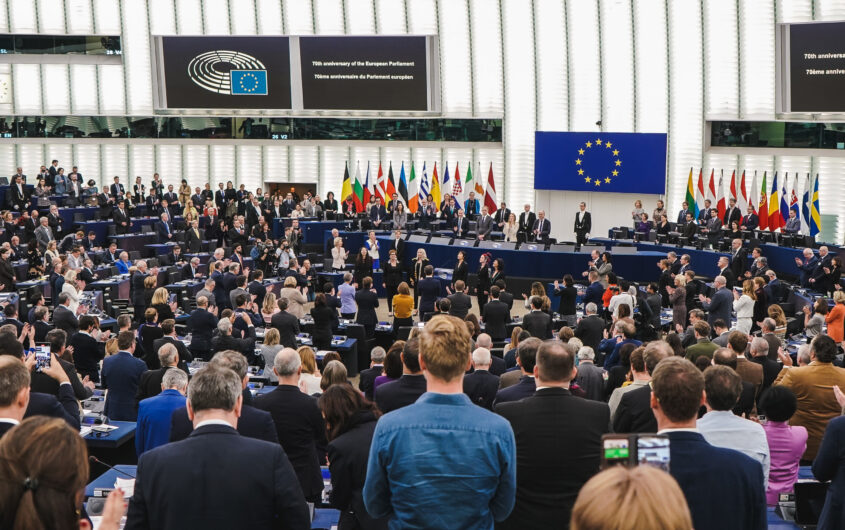
European Parliament via flickr
What the Elections in France and the UK Don’t Tell Us about Europe

Peter S. Rashish
Vice President; Director, Geoeconomics Program
Peter S. Rashish, who counts over 30 years of experience counseling corporations, think tanks, foundations, and international organizations on transatlantic trade and economic strategy, is Vice President and Director of the Geoeconomics Program at AICGS. He also writes The Wider Atlantic blog.
Mr. Rashish has served as Vice President for Europe and Eurasia at the U.S. Chamber of Commerce, where he spearheaded the Chamber’s advocacy ahead of the launch of the Transatlantic Trade and Investment Partnership. Previously, Mr. Rashish was a Senior Advisor for Europe at McLarty Associates, Executive Vice President of the European Institute, and a staff member and consultant at the International Energy Agency, the World Bank, UN Trade and Development, the Atlantic Council, the Bertelsmann Foundation, and the German Marshall Fund.
Mr. Rashish has testified before the House Financial Services Subcommittee on International Monetary Policy and Trade and the House Foreign Affairs Subcommittee on Europe and Eurasia and has advised three U.S. presidential campaigns. He has been a featured speaker at the Munich Security Conference, the Aspen Ideas Festival, and the European Forum Alpbach and is a member of the Board of Directors of the Jean Monnet Institute in Paris and a Senior Advisor to the European Policy Centre in Brussels. His commentaries have been published in The New York Times, the Financial Times, The Wall Street Journal, Foreign Policy, and The National Interest, and he has appeared on PBS, CNBC, CNN, NPR, and the BBC.
He earned a BA from Harvard College and an MPhil in international relations from Oxford University. He speaks French, German, Italian, and Spanish.
Political pendulums in an unstable Europe are swinging faster, more wildly, and in unpredictable ways.
Except when they’re not.
There is certainly evidence for the first narrative given the results of the July 4 elections for a new UK parliament and the June 30 and July 7 snap legislative elections in France.
In the UK, after 14 years of rule by the Conservatives—who like to see themselves as the country’s natural party of government—the center-left Labor Party scored a stunning victory, gaining 412 out of 650 seats and delivering the incumbents their worst electoral performance in history. But questions are already being raised about new Prime Minister Keir Starmer’s potential to match the longevity of Labor’s last turn in office (1997-2010) given the fickle nature of the electorate.
In France, fears were rampant in Germany and elsewhere that the far-right National Rally party, which bested President Macron’s centrists and the left-wing New Popular Front bloc (NFP in its French initials) in the first round, would gain enough votes in the second to lead a new government. Yet within just a week, the results were nearly turned upside down. The National Rally was in last place, Macron’s “Ensemble” grouping was second, and the NFP came out on top.
There are clearly differences between the two countries, despite the victory of the left of the political spectrum in both. In London, Prime Minister Starmer can count on a stable majority for a full five-year term. In Paris, the prospect for a governing majority is uncertain unless President Macron can manage to convince the more moderate parts of the NFP to join his centrists in a coalition.
The most important difference, however, is not between the situations in France and the UK but rather between what is happening in individual European countries on the one hand and at the European Union on the other.
Improving the EU’s growth prospects and increasing its resilience to geopolitical shocks should help to bring political pendulum shifts in Europe back to a more natural rhythm.
EU member France is not alone in its rollercoaster politics. In the Netherlands, after 14 years of governance by center-right liberal Prime Minister Mark Rutte, the country has a new coalition government whose leader has no party affiliation and that includes two parties that did not exist until recently. In Germany, the three-party coalition led by Social Democratic Chancellor Olaf Scholz would garner only 32 percent of the vote today, down from 52 percent at the 2021 elections.
But the European Parliament elections held just a month ago on June 9 tell a different story, one about stability. The three parties that shared decision-making in the previous chamber—the center-right European People’s Party, the liberal Renew Europe, and the center-left Socialists and Democrats—together have 400 seats. That is down from the 443 they scored in 2019, but given widespread concerns about the rise of the far-right, it is a literal vote of confidence in the mainstream parties.
There is an important lesson here. With politics at the EU level in Brussels (relatively) predictable and functional, now is the time for the incoming leadership to press for reform.
If as expected Ursula von der Leyen is approved for a second term as European Commission President, she and her team of commissioners should focus on widening and deepening the EU single market, especially in areas like defense procurement (which would save money) and financial markets (which would raise new money). She should also appoint a new Economic Security Commissioner whose role would be to ensure that EU policies in trade, industrial policy, and technology are aligned on behalf of its prosperity and strategic interests.
By improving the EU’s growth prospects and increasing its resilience to geopolitical shocks, these steps should also help boost voters’ confidence in their national governments—in turn helping to bring political pendulum shifts back to a more natural rhythm.








